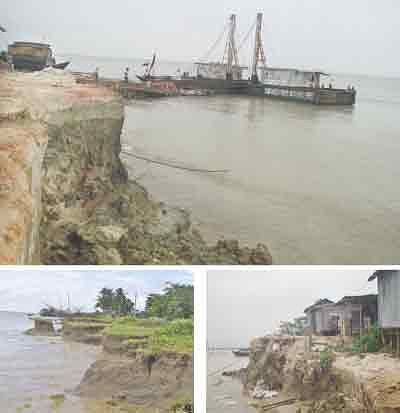Erosion in Chandpur renders over 100 families homeless

The Meghna devours a large portion of Harina Ferry Terminal in Chandpur Sadar upazila, bottom from left, continues to erode Laxmipur and Harina villages in the upazila. The onslaught of the river has made over 100 families of the two villages homeless in the last few days.Photo: STAR
Erosion by Meghna River took an alarming turn in the last few days, rendering over 100 families homeless in Hanar Char and Laxmipur unions in Sadar upazila.
According to the affected people of Harina village, onrush of flood waters from upstream and heavy rain in the last two weeks swelled Meghna, flooding the areas on its banks.
This made over 100 families of low-lying Laxmipur and Harina villages homeless, locals and officials said.
A large number of flood victims took shelter on a nearby flood control embankment and other adjacent highlands.
About a thousand other families, living close to the river, are passing their days in anxiety and fear of being devoured by the Meghna in the near future.
Locals alleged that erosion along three kilometer areas on the river bank earlier washed away scores of homesteads in Laxmipur village and Harina ferry terminal in Sadar upazila.
Erosion-hit Rashida, 40, and Zakir Hossain Mridha, 35, of Laxmipur village said they had been passing sleepless nights in fear of erosion.
"Where will we go? We are all poor people," said Rashida.
Chandu Dhali, Abul Kalam and Shafiq Majhi of Harina village alleged that unplanned dredging had sped up the erosion. They demanded immediate end to dredging in the area.
BIWTA official Nasir Khan said they had to shift the Harina ferry terminal several times due to constant erosion.
Executive engineer of Chandpur PWD Jibon Krishna Das, who visited the affected areas on Saturday, tried to allay fear, saying that the erosion will not intensify further.
He said a Tk 35 crore project was underway to save areas adjacent to Laxmipur cluster village and Harina terminal.
He said bamboo piling and dumping of sand bags will start soon for temporary protection of the vulnerable places. But the main protection work will be done in next dry season.

 For all latest news, follow The Daily Star's Google News channel.
For all latest news, follow The Daily Star's Google News channel. 



Comments